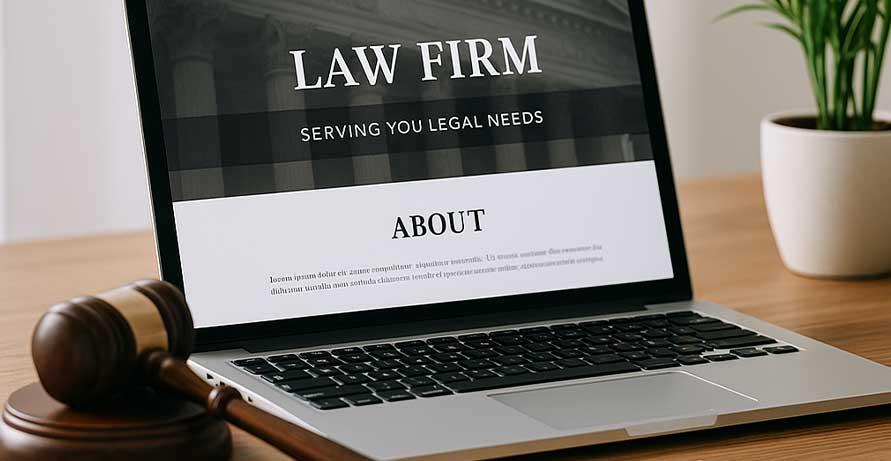7 Website Design Features Every U.S. Attorney Needs to Win Client Trust

In today’s competitive legal market, a law firm’s website is often the first interaction a potential client has with an attorney. For U.S. attorneys, design choices directly influence whether a visitor feels confident enough to reach out. The right website features build credibility, improve client engagement, and strengthen online visibility. This article shares the seven most important design elements for law firm websites, with insights from Anchor Points’ experience helping attorneys improve trust and grow their practices.
First Impressions Shape Law Firm Credibility
The first seconds on a law firm’s website often decide whether a visitor stays or moves on. A polished design combined with a clear structure sends a signal of professionalism. At Anchor Points, we have seen that attorneys who invest in intuitive navigation, clean layouts, and brand-consistent visuals create a sense of reliability. Clients searching for legal help want reassurance that the attorney is organized, attentive, and ready to take on their case.
Clear and Accessible Legal Service Information
Clients want to know exactly what an attorney offers without digging through complex menus or legal jargon. A well-designed law firm website presents services clearly, explains practice areas in plain language, and keeps contact options visible on every page. Mobile responsiveness is no longer optional. With most legal searches happening on smartphones, a responsive design improves usability and shows that the attorney values every client’s convenience.
Building Personal Connection Through Authentic Profiles
People hire attorneys they trust, and trust is built through personal connection. Professional photos, relatable biographies, and well-presented client testimonials make a legal website more approachable. We have found that narrative-driven attorney bios, combined with thought leadership content such as legal articles or blog posts, help position lawyers as both skilled professionals and approachable advisors.
Website Speed and Reliability Reflect Professionalism
A slow or outdated law firm website can cost an attorney valuable leads. Clients expect quick-loading pages, working links, and up-to-date information. Many small firms face challenges here because they lack in-house web management. This makes the decision between working with a freelancer or partnering with a web agency critical for long-term success.
Freelancer vs. Web Agency for Attorney Websites
Freelancers can offer affordable, flexible solutions for small or short-term projects. However, they may not always be available for urgent updates or large-scale improvements. Web agencies bring a team-based approach with structured processes, ongoing support, and scalability. At Anchor Points, we combine website strategy, SEO, marketing websites, and cybersecurity to help attorneys maintain a competitive online presence. While agencies may cost more upfront, they often deliver greater long-term value and stability.
Security and Privacy Are Non-Negotiable in Legal Websites
Law firm websites must protect sensitive client information. Secure contact forms, SSL certificates, and clear privacy policies are essential. In our experience, firms that invest in secure hosting and encrypted intake forms not only comply with industry standards but also strengthen client confidence. Regular security audits further ensure that confidential data remains protected.
SEO Helps Attorneys Get Found and Trusted
High search rankings help attorneys appear credible and accessible. Effective law firm SEO combines keyword optimization, high-quality content, fast site performance, and local search strategies. At Anchor Points, we have helped legal professionals rank higher in Google searches by optimizing their Google Business Profile, implementing structured data for legal services, and creating targeted content that meets client search intent.
Final Thoughts: Turning Website Visitors into Clients
A law firm website should do more than look good. It should guide visitors, answer their questions, and give them the confidence to make contact. Attorneys who prioritize these seven design features position themselves for higher conversions and stronger client relationships. Whether working with a skilled freelancer or a full-service agency, the priority should be a trustworthy, user-friendly, and secure online presence.
At Anchor Points, we help law firms create marketing websites, implement SEO strategies, and provide long-term support so their online presence grows alongside their practice. If you are ready to make your website a true business asset, schedule a consultation with our team.
FAQs
1. Why is mobile responsiveness so important for attorney websites?
Most legal service searches happen on mobile devices. A mobile-friendly design ensures that your website is easy to navigate, loads quickly, and provides a positive user experience regardless of screen size.
2. How often should attorneys update their website content?
Updating your website at least quarterly keeps it fresh for search engines and shows potential clients that your practice is active. Regular updates to blog posts, case results, and attorney bios can improve both SEO and trust.
3. What security measures should a law firm website have?
Essential security features include SSL certificates, encrypted contact forms, secure hosting, and regular security audits. These measures protect client data and maintain compliance with privacy regulations.
4. Should I hire a freelancer or an agency for my law firm website?
Freelancers can be cost-effective for smaller projects, but agencies offer a full team for design, SEO, content, and support. For long-term stability and scalability, many law firms find that partnering with an agency delivers better results.








